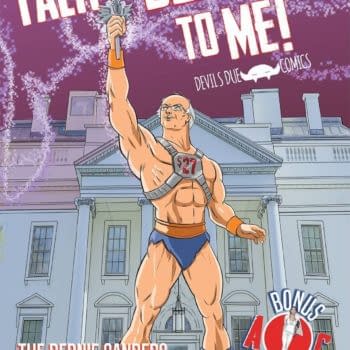Posted in: Movies | Tagged: Killer Robot, The New York Times, The Washington Post
New York Times and Washington Post Have a Killer Robot Duel
Skynets and Cylons and Hosts, oh my.
In an article reminiscent of the perennial "do video games create psychopaths" debate, no less than the New York Times itself questioned this week whether or not killer robot fiction is bad for us. Ed Finn, the Director of the Center for Science and Imagination at Arizona State University, thinks so. In his November 15 op-ed, Finn opines that:
"We have lots of stories about the power and the duplicitous nature of A.I., but almost none exploring what he calls the "Untold A.I." themes: accountability, effective policy and broad literacy around these technologies." Finn writes, adding "Instead of worrying about godlike super-machines, we should tell better stories about all the everyday ways A.I. is already changing the world."
It's an interesting POV, although – speaking of scary images seeping into the cultural psyche – is it worth noting here that ASU's mascot is an actual demon?
It is worth noting however, that a Hollywood epic about how cool Alexa is probably wouldn't do Matrix-level box office. But does that matter? Does market success equal sociological value? After all, Paddington 2 made a cool 226 mil this year.
In a battle of the newspaper titans, Charli Carpenter and Kevin L. Young attempt to pull the power pack out of Finn's piece. They asked a "representative sample" (?) of 1000 people whether they'd been watching killer robot TV and movie fare. They then asked one group their views of autonomous weapons straight up, and another group was first primed with scary sci-fi references , presumably to be sure images of HAL or Ava of Ex Machina were firmly in place before they answered. The researchers found no "significant effect."
On the other hand…
"Where we did find an important effect was in sci-fi consumption. People who reported that they had seen a lot of sci-fi films were more likely to oppose trends in autonomous weaponry. Their reaction was even stronger if they were "primed" by getting the sci-fi questions in the survey first. However, this only happened with the most fluent science-fiction buffs in our sample, not for the overall population."
But in a sense, wasn't this Finn's very point? Who's right here?
For my part, the whole back-and-forth brings up two questions: 1. How do you get a cool geeky job title like "Director of the Center for Science and Imagination" and be someone who disses science fiction, and 2. where can I get a job that pays me to ask 1000 people their views on killer robots?
At any rate, the great cultural debate of our time rages on…














